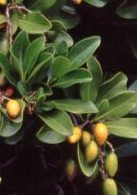 Also known as karaka, this narrow upright evergreen tree grows in coastal and lowland forests of New Zealand. It a shrubby habit with erect or spreading branches. The large leathery oblong leaves are shiny , dark green, and 6-8 inches long by 2 ½ to 3 ½ inches wide. In spring, tiny greenish to off white flowers are produced in erect panicles. The fleshy fruits that follow in late summer are ½ to 1 ½ inches long and yellow to orange in colored when mature. The pulp is edible but the single seed is very poisonous. The generic name, Corynocarpus, comes from Greek words korne meaning club and carpos meaning fruit and refers to the shape of the fruit. The specific epithet, laevigatus, comes from the Latin word meaning smooth and refers to the leaves. The plant is a good choice for a hedge, screen, or espalier, and its foliage is excellent in flower arrangements.
Also known as karaka, this narrow upright evergreen tree grows in coastal and lowland forests of New Zealand. It a shrubby habit with erect or spreading branches. The large leathery oblong leaves are shiny , dark green, and 6-8 inches long by 2 ½ to 3 ½ inches wide. In spring, tiny greenish to off white flowers are produced in erect panicles. The fleshy fruits that follow in late summer are ½ to 1 ½ inches long and yellow to orange in colored when mature. The pulp is edible but the single seed is very poisonous. The generic name, Corynocarpus, comes from Greek words korne meaning club and carpos meaning fruit and refers to the shape of the fruit. The specific epithet, laevigatus, comes from the Latin word meaning smooth and refers to the leaves. The plant is a good choice for a hedge, screen, or espalier, and its foliage is excellent in flower arrangements.
 Type: Evergreen tree
Type: Evergreen tree
Outstanding Feature: Foliage
Form: Narrow, upright
Growth Rate: Moderate to slow
Bloom: Tiny green to off white flowers in upright panicles in spring
Size: 20-50’ x 8-20’
Light: Prefers partial shade and will burn in very hot sun.
Soil: Light humusy soil, moderately moist, well-drained
Hardiness: Zones 9-11
Care: Prune when young for tree habit; shear to use as a hedge. Apply leaf mold annually, manure once every two years in the fall.
Pests and Diseases: Relatively pest and disease free.
Propagation: Seed
Comments: Keep children away from the fruits as they contain a poisonous seed.